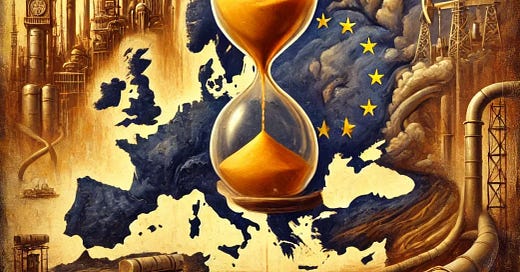“Our former model is over. If we follow our classical agenda, we will be out of the market.”
- Emmanuel Macron
The alarm bells are beginning to ring in Europe, as a good quality of life sometimes blinds us to the rising threat of European reliance on foreign powers for technological and national security. In 2008, the European Union had a nominal GDP larger than that of the United States. Less than 20 years later, the U.S. has not only surpassed Europe but has roughly a 1.5 times larger GDP. Moreover, the Technology, engineering, and AI sectors are dominated by the US and China, while industry and the scale of production in the United States and China greatly surpass those of Europe. To add on to Europe’s problems, it is heavily dependent on oil and natural gas imports. Previously the EU relied on Russia and it is now forced to shift its focus to the United States and Qatar for crude oil.
Overregulation, lack of data centers and limited investment in data analytics and AI have made Europe fall behind, causing economic stagnation. The European Parliament’s war on big tech has only been successful in preventing innovation and investment in Europe. Europe’s largest tech company, SAP, has a meager market value of $287B, whereas the United States has eight companies worth over one trillion USD, and is the world leader in generative AI, ahead of China. The European Union as a whole has become a distant third power, barely surpassing the UK, which has a tenth of the population and is also lagging in the sector. One of the reasons for this lack of innovation is not just overregulation of companies but also stringent data and privacy legislation which hinders the advancements of companies, leaving them behind in data collection, which is a prerequisite for research specifically in the area of generative AI. Whilst the average corporate income tax rate in the EU may be lower than that in the United States (21.5% vs. 25.6%), lower GDP Eastern European countries such as Hungary (8%) and Romania (16%) are disproportionately responsible for the disparity, whereas Europe’s economic engine, Germany, has a corporate tax rate that exceeds 30%, disincentivizing innovation and investment.
Currently, Europe’s outlook seems grim, and with the Trump administration’s “America First” orientation and threat of tariffs, Europe seems more vulnerable than ever, as it is finally realizing that it is no longer the largest nor the most important foreign priority of the United States, and that the EU has stand alone to survive and engage in healthy and equal competition with the U.S. and China with the hope of retaining its global influence. Europe may not be in a position to do this currently, particularly due its lack of natural resources, but it can return as a driving force and innovator of the free world by lowering corporate and individual taxation, emphasizing deregulation and pursuing freer trade policies. However, I must delineate that Europe’s ascension should not rely on trading partners that pose a threat to its national security, such as China and Russia, the latter having already attempted to leverage Europe’s energy related shortcomings as a deterrent against European aid to Ukraine. The EU’s import needs should primarily be met through its allies, before Europe can once again stand on its own.




